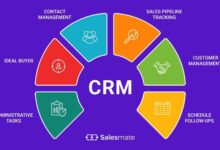CRM with AI Chatbot Integration: Enhanced Customer Engagement
CRM with AI Chatbot Integration represents a significant advancement in customer relationship management. By seamlessly blending the organizational power of a CRM system with the conversational abilities of an AI-powered chatbot, businesses can dramatically improve customer interactions, streamline processes, and boost overall efficiency. This integration allows for personalized, 24/7 support, automated lead qualification, and valuable data-driven insights, ultimately leading to increased customer satisfaction and higher conversion rates. This exploration will delve into the benefits, implementation, and future potential of this transformative technology.
The synergy between CRM and AI chatbots offers a compelling solution for businesses seeking to optimize their customer service and sales strategies. This powerful combination streamlines communication, automates repetitive tasks, and provides valuable data-driven insights into customer behavior. We’ll examine the various aspects of this technology, from its core functionality and implementation challenges to its future implications and the potential for enhanced customer experiences.
Defining CRM with AI Chatbot Integration
Integrating AI-powered chatbots into Customer Relationship Management (CRM) systems is revolutionizing how businesses interact with their customers, leading to increased efficiency and improved customer satisfaction. This integration leverages the strengths of both technologies to create a powerful and streamlined customer experience.
A CRM system, at its core, is a centralized database that stores and manages all interactions and information related to a company’s customers. This includes contact details, purchase history, communication logs, and other relevant data. The primary functionality revolves around organizing customer data, automating sales processes, tracking marketing campaigns, and providing insights into customer behavior to improve business strategies. Effective CRM systems enable businesses to personalize customer interactions, leading to stronger relationships and increased customer loyalty.
AI Chatbot Capabilities
AI-powered chatbots are sophisticated software programs that utilize natural language processing (NLP) and machine learning (ML) to understand and respond to human language. They can engage in conversations, answer questions, provide support, and even complete tasks autonomously. Key capabilities include understanding complex queries, learning from past interactions to improve accuracy, and integrating with other systems to access and share information. These chatbots can operate 24/7, providing immediate responses and resolving issues without human intervention for many common inquiries.
CRM and AI Chatbot Integration: Enhancing Customer Interactions
Integrating an AI chatbot into a CRM system allows for seamless and efficient customer interactions. The chatbot can access the customer’s information stored within the CRM, providing personalized responses and tailored support. This real-time access to customer data empowers the chatbot to offer relevant product recommendations, track order status, resolve issues quickly, and provide proactive assistance based on past interactions or predicted needs. The integration streamlines communication, freeing up human agents to focus on more complex or sensitive customer issues.
Real-World Applications of CRM with AI Chatbot Integration
Numerous industries utilize CRM systems integrated with AI chatbots. For example, e-commerce businesses use them to handle order inquiries, track shipments, and answer product questions. In the financial sector, chatbots assist with account inquiries, transaction processing, and fraud prevention. Healthcare providers leverage them to schedule appointments, answer patient questions, and provide medication reminders. Customer service departments across various sectors use these systems to reduce wait times, handle a higher volume of inquiries, and improve overall customer satisfaction. A large telecommunications company, for example, might use this integration to automatically handle billing inquiries and troubleshoot basic technical issues, significantly reducing call center load.
Comparison of CRM Systems with and without AI Chatbot Integration
| Feature | CRM without AI Chatbot | CRM with AI Chatbot | Benefits of AI Integration |
|---|---|---|---|
| Customer Support | Relies primarily on human agents; limited availability | Provides 24/7 support through automated chatbot responses | Increased availability, reduced wait times, improved response speed |
| Lead Qualification | Manual process, potentially time-consuming | Automates lead qualification through conversational interactions | Faster lead identification, improved efficiency, higher conversion rates |
| Sales Process Automation | Limited automation; many tasks require manual intervention | Automates tasks like order processing, appointment scheduling, and follow-ups | Increased efficiency, reduced manual effort, improved sales productivity |
| Customer Insights | Relies on manual analysis of data; insights may be delayed | Provides real-time insights into customer behavior and preferences | Data-driven decision-making, personalized customer experiences, improved marketing strategies |
Benefits and Advantages
Integrating AI chatbots into your CRM system offers a multitude of benefits, significantly enhancing efficiency, customer satisfaction, and ultimately, your bottom line. These advantages stem from the automation of repetitive tasks, the personalization of customer interactions, and the insightful data analysis that AI provides. The result is a more streamlined, responsive, and profitable business operation.
Improved Customer Service Efficiency is significantly boosted through AI-powered chatbots. These bots handle a large volume of routine inquiries, freeing up human agents to focus on more complex issues requiring personalized attention. This leads to faster response times, reduced wait times, and improved overall customer experience.
Improved Customer Service Efficiency
AI-powered chatbots provide 24/7 availability, addressing customer queries instantly regardless of time zone or business hours. This constant accessibility leads to increased customer satisfaction and reduces the frustration associated with long wait times. Furthermore, chatbots can handle multiple conversations simultaneously, dramatically increasing the efficiency of your customer service team. For example, a company using a chatbot might see a 30% reduction in average handling time for common questions, freeing up agents to deal with more intricate customer issues. This translates to better resource allocation and improved overall customer service efficiency.
Enhanced Lead Generation and Qualification Processes
AI chatbots can proactively engage website visitors, gather information through interactive questionnaires, and qualify leads based on pre-defined criteria. This automation streamlines the lead generation process, identifying high-potential leads and filtering out unqualified ones, saving valuable time and resources. Imagine a scenario where a chatbot qualifies leads based on their website behavior and engagement, immediately routing high-potential leads to sales representatives for a timely follow-up. This ensures that sales efforts are focused on leads most likely to convert.
Impact on Sales Conversion Rates
The speed and personalization offered by AI-powered chatbots can directly influence sales conversion rates. By providing instant answers to customer questions, guiding them through the sales process, and proactively addressing potential objections, chatbots can significantly improve the likelihood of a sale. For instance, a company implementing a chatbot might observe a 15% increase in conversion rates due to improved lead nurturing and faster response times. This demonstrates the direct link between efficient communication and successful sales outcomes.
Increased Customer Satisfaction and Loyalty
Providing prompt, accurate, and personalized responses fosters customer satisfaction and builds loyalty. AI chatbots contribute significantly to this by offering consistent service, immediate support, and tailored interactions. For example, a company might track customer satisfaction scores and observe a 20% increase after implementing an AI-powered chatbot, indicating improved customer experience and increased loyalty. This positive feedback loop leads to repeat business and positive word-of-mouth referrals.
Cost Savings Achieved Through Automation
Automating routine tasks through AI chatbots reduces the need for a large customer service team, leading to significant cost savings. These savings can be reinvested in other areas of the business to further improve efficiency and customer experience. For example, a company might reduce its customer service staffing costs by 10% after implementing a chatbot, while simultaneously improving customer service response times. This highlights the potential for significant financial benefits.
Key Benefits Summary
- Improved Efficiency: Reduced wait times, faster response times, and increased agent productivity.
- Enhanced Lead Generation: Proactive lead qualification and capture of valuable customer data.
- Higher Conversion Rates: Improved customer engagement and personalized sales support.
- Increased Customer Satisfaction: 24/7 availability, personalized interactions, and prompt responses.
- Significant Cost Savings: Reduced operational costs associated with customer service.
Implementation and Integration Challenges
Integrating AI chatbots with existing CRM systems presents a multifaceted challenge, requiring careful consideration of technical, security, and data management aspects. Successful implementation hinges on a well-defined strategy that addresses potential hurdles and leverages the strengths of both technologies. Ignoring these challenges can lead to integration failures, compromised data security, and ultimately, a suboptimal user experience.
Technical Integration Challenges
Integrating an AI chatbot with a CRM system involves several technical complexities. Data format discrepancies between the chatbot platform and the CRM database often require custom data transformation processes. API limitations or compatibility issues between the two systems might necessitate workarounds or the development of custom connectors. Ensuring seamless data flow and real-time updates across both platforms can also be technically demanding, requiring robust API management and efficient data synchronization mechanisms. Furthermore, the chatbot’s ability to access and interpret CRM data accurately depends on the quality and structure of the CRM data itself. Poorly structured or incomplete data can hinder the chatbot’s performance and accuracy.
Data Security and Privacy
Data security and user privacy are paramount concerns when integrating AI chatbots with CRM systems. The chatbot will inevitably handle sensitive customer data, necessitating robust security measures to protect this information from unauthorized access or breaches. Compliance with relevant data privacy regulations, such as GDPR and CCPA, is crucial. This includes implementing encryption protocols, access control mechanisms, and regular security audits to ensure the confidentiality, integrity, and availability of customer data. Furthermore, transparent data handling policies should be communicated to customers, outlining how their data is collected, used, and protected.
Robust Data Management Strategies
Effective data management is essential for successful AI chatbot integration. A comprehensive strategy should address data quality, consistency, and accessibility. Data cleansing and standardization are necessary to ensure the chatbot receives accurate and reliable information. Efficient data storage and retrieval mechanisms are required to handle large volumes of customer interaction data. Moreover, a well-defined data governance framework should be established to manage data access, usage, and retention policies. This includes mechanisms for data backup, recovery, and disaster recovery planning to mitigate potential data loss scenarios.
Training and Customization of the AI Chatbot
Training and customizing the AI chatbot to meet specific business needs is a crucial step in the integration process. This involves feeding the chatbot with relevant data from the CRM system, such as customer profiles, product information, and past interactions. The training process should be iterative, involving continuous monitoring and refinement of the chatbot’s responses based on its performance and user feedback. Natural Language Processing (NLP) techniques are essential for enabling the chatbot to understand and respond to customer queries accurately and effectively. Furthermore, the chatbot should be customized to reflect the brand’s voice and tone, ensuring a consistent and positive customer experience.
Comparison of Integration Methods
Different methods exist for integrating AI chatbots with CRM systems, each with varying levels of complexity, cost, and scalability. These methods range from simple plug-and-play integrations using pre-built connectors to more complex custom integrations requiring significant development effort. The choice of integration method depends on factors such as the existing CRM system, the chatbot platform, and the specific business requirements.
| Method | Complexity | Cost | Scalability |
|---|---|---|---|
| Pre-built Integrations (e.g., App Marketplace Connectors) | Low | Low to Moderate | Moderate |
| API-based Integration | Moderate | Moderate to High | High |
| Custom Development | High | High | High |
Features and Functionality
Integrating an AI chatbot into a CRM system significantly enhances its capabilities, transforming how businesses interact with customers and manage internal processes. This integration leverages the power of artificial intelligence to automate tasks, personalize interactions, and provide efficient customer support. The resulting system offers a more streamlined and effective approach to customer relationship management.
AI chatbots within a CRM system offer a range of features designed to improve efficiency and customer satisfaction. These features work in tandem to provide a seamless and personalized experience for both customers and support staff. The core functionality revolves around automating routine tasks, providing instant support, and analyzing customer interactions to improve future strategies.
AI Chatbot Handling of Customer Inquiries and Support Requests
The AI chatbot acts as the first point of contact for many customer inquiries and support requests. Using natural language processing (NLP), the chatbot analyzes the customer’s message, identifies the intent, and provides an appropriate response. This could range from answering simple FAQs to resolving more complex issues by escalating them to a human agent. The system learns from each interaction, improving its accuracy and efficiency over time. For example, if a customer repeatedly asks about shipping times, the chatbot might be trained to proactively offer this information during future interactions. This proactive approach reduces customer frustration and improves overall satisfaction.
The Role of Natural Language Processing (NLP) in Improving Chatbot Performance
NLP is the backbone of an AI-powered CRM chatbot. It allows the chatbot to understand and interpret human language, enabling it to engage in meaningful conversations with customers. NLP algorithms analyze the syntax, semantics, and context of the customer’s message to determine the intent and sentiment. Advanced NLP techniques, such as sentiment analysis, allow the chatbot to understand the emotional tone of the customer’s message, enabling it to tailor its response appropriately. For instance, if a customer expresses frustration, the chatbot might offer a more empathetic response and escalate the issue to a human agent more quickly. This continuous learning and improvement through NLP significantly enhances the chatbot’s performance and accuracy.
Personalizing Customer Interactions with AI Chatbots
AI chatbots can personalize customer interactions by leveraging data from the CRM system. This data might include past purchase history, communication preferences, and customer demographics. By accessing this information, the chatbot can tailor its responses to individual customers, providing a more relevant and engaging experience. For example, a chatbot might greet a returning customer by name and offer personalized recommendations based on their previous purchases. This level of personalization fosters stronger customer relationships and increases customer loyalty. Companies like Amazon effectively utilize this approach, offering product suggestions based on browsing and purchase history.
Automating Routine Tasks with AI Chatbots
AI chatbots can automate a wide range of routine tasks within the CRM, freeing up human agents to focus on more complex issues. These tasks include scheduling appointments, answering frequently asked questions, providing order updates, and sending follow-up emails. By automating these tasks, the chatbot increases efficiency and reduces the workload on support staff. For example, a chatbot could automatically send order confirmation emails, track shipments, and notify customers of any delays. This automation improves response times and reduces the risk of human error.
Key Features of an AI-Powered CRM Chatbot
The effectiveness of an AI-powered CRM chatbot hinges on a robust set of features. A well-designed system should incorporate the following:
- 24/7 Availability: Providing round-the-clock customer support.
- Multilingual Support: Catering to a diverse customer base.
- Seamless Integration with CRM: Allowing for easy access to customer data.
- Personalized Interactions: Tailoring responses to individual customers.
- Advanced NLP Capabilities: Ensuring accurate understanding of customer inquiries.
- Automated Task Management: Handling routine tasks efficiently.
- Scalability: Adapting to increasing customer volume.
- Reporting and Analytics: Providing insights into customer interactions.
- Security and Privacy: Protecting sensitive customer data.
Future Trends and Developments
The integration of AI and CRM is rapidly evolving, promising a future where customer interactions are hyper-personalized, efficient, and proactive. This section explores the emerging trends shaping this exciting landscape and offers predictions for the future of AI-powered CRM systems.
The convergence of advanced AI technologies like machine learning (ML) and deep learning (DL) with CRM is driving significant transformations. These technologies are no longer merely supplementary features; they are becoming the core engine powering next-generation CRM systems.
Predictive Analytics and Proactive Customer Service
Predictive analytics, fueled by ML and DL algorithms, will play an increasingly crucial role. By analyzing vast amounts of customer data, these systems can anticipate customer needs and proactively offer solutions. For instance, a telecommunications company might predict when a customer is likely to churn based on usage patterns and proactively offer a retention deal, preventing customer loss. This proactive approach significantly improves customer retention rates and reduces churn costs.
Hyper-Personalization and Customer Journey Optimization
AI-powered CRM systems will enable unprecedented levels of personalization. By analyzing individual customer preferences, behaviors, and interactions, businesses can tailor their communications and offers with laser precision. Imagine a retail company dynamically adjusting its website content and product recommendations based on a customer’s browsing history and past purchases, resulting in a more engaging and satisfying shopping experience. This hyper-personalization extends beyond marketing; it informs sales strategies and customer support interactions, creating seamless and personalized customer journeys.
Enhanced Customer Support Through Advanced Chatbots
AI-powered chatbots are evolving beyond simple FAQs. They are becoming sophisticated virtual assistants capable of understanding natural language, resolving complex issues, and even anticipating customer needs. For example, a chatbot integrated into a banking CRM could assist customers with account inquiries, transaction processing, and even fraud detection. This leads to improved customer satisfaction, reduced wait times, and increased operational efficiency for customer support teams.
Automation of Repetitive Tasks and Increased Efficiency
AI will automate numerous repetitive tasks within the CRM system, freeing up human agents to focus on more complex and value-added activities. This includes tasks such as data entry, lead qualification, and appointment scheduling. The automation of these tasks improves overall business efficiency and reduces operational costs. For example, a sales team could use AI to automatically qualify leads based on predefined criteria, ensuring that sales representatives focus their efforts on the most promising prospects.
The Future of CRM: A Glimpse into 2030
Imagine a world in 2030 where AI-powered CRM systems are ubiquitous. Businesses operate with a 360-degree view of each customer, anticipating their needs before they even articulate them. Personalized marketing campaigns are delivered seamlessly across all channels, and customer service is instantaneous and highly effective, powered by intelligent chatbots and augmented human agents. Proactive interventions prevent churn, and sales teams are armed with predictive insights, leading to increased conversion rates and revenue growth. Data-driven decision-making is the norm, and businesses thrive by fostering deep, meaningful relationships with their customers, all powered by the seamless integration of AI and CRM.
Conclusive Thoughts
In conclusion, the integration of AI chatbots into CRM systems presents a powerful opportunity for businesses to revolutionize their customer interactions and operational efficiency. By leveraging the strengths of both technologies, companies can create more personalized and engaging customer experiences, automate crucial tasks, and gain valuable insights into customer behavior. While implementation challenges exist, the potential rewards – increased customer satisfaction, improved lead generation, and enhanced sales conversion rates – make this a strategic investment for businesses of all sizes. The future of CRM is undeniably intertwined with the continued advancement of AI, promising even more innovative and impactful applications in the years to come.





